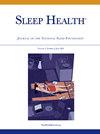非性别二元青年的睡眠健康:加拿大全国抽样调查结果。
IF 3.4
2区 医学
Q2 CLINICAL NEUROLOGY
引用次数: 0
摘要
目标睡眠对青少年的健康非常重要。超二元青年(性别身份不属于二元性别的青年)的独特需求,以及具有这些身份的青年人数的不断增加,突出表明我们有必要更好地了解这一人群的睡眠健康状况。本研究的目标是:(1)研究超二元青年和二元青年在睡眠健康方面的差异;(2)探索社会支持、同伴伤害和技术使用如何造成这些差异:数据来自2017/2018学龄儿童健康行为调查。青少年(14 至 17 岁,n = 10,186 人)表示他们是超二元(n = 182 人)还是二元(n = 10,004 人),并完成睡眠健康测量(入睡困难、保持清醒困难、工作日和周末睡眠时长)、他们还填写了睡眠健康度量表(入睡困难、保持清醒困难、工作日和周末睡眠时长)、协变量(年龄、家庭富裕程度、种族/民族、抑郁症状),以及可能导致超二元青年和二元青年之间差异的变量(家庭、朋友和老师的支持,以及同伴伤害和睡前使用技术)。研究结果在所有结果中,超二元青年的睡眠健康状况都较差,入睡困难和平日睡眠时间的差异在考虑协变量后依然存在。在所有睡眠结果中,超二元状态对家庭支持和学校氛围都有显著的间接影响。通过同伴伤害也观察到了对睡眠质量的间接影响:研究结果支持对睡眠等基本健康过程进行研究,以更好地了解与超二元身份相关的压力因素如何影响这一弱势群体的健康结果。本文章由计算机程序翻译,如有差异,请以英文原文为准。
Sleep health among youth outside of the gender binary: Findings from a national Canadian sample
Objectives
Sleep is important for adolescent health. The unique needs of suprabinary youth (youth with gender identities outside of the gender binary), along with the growing number of youth with these identities, underscores the need to better understand sleep health within this population. The current study’s objectives were to (1) examine differences in sleep health between suprabinary and binary youth and (2) explore how social support, peer victimization, and technology use accounted for these differences.
Methods
Data were drawn from the 2017/2018 Health Behavior in School Aged Children Survey. Adolescents (individuals ages 14 to 17, n = 10,186), indicated whether they were suprabinary (n = 182) or binary (n = 10,004), and completed measures of sleep health (difficulty falling asleep, difficulty staying awake, weekday and weekend sleep length), covariates (age, family affluence, race/ethnicity, depressive symptoms), as well as variables that may account for differences between suprabinary and binary youth (family, friend, and teacher support, as well as peer victimization, and technology use before bed).
Results
Suprabinary youth reported worse sleep health on all outcomes, and differences persisted for both difficulty falling asleep and weekday sleep hours accounting for covariates. Significant indirect effects between suprabinary status were observed across all sleep outcomes for family support and school climate. Indirect effects for sleep quality were also observed via peer victimization.
Conclusions
Findings support the relevance of looking at basic health processes like sleep to better understand how the stressors associated with suprabinary status impact health outcomes among this vulnerable population.
求助全文
通过发布文献求助,成功后即可免费获取论文全文。
去求助
来源期刊

Sleep Health
CLINICAL NEUROLOGY-
CiteScore
6.30
自引率
9.80%
发文量
114
审稿时长
54 days
期刊介绍:
Sleep Health Journal of the National Sleep Foundation is a multidisciplinary journal that explores sleep''s role in population health and elucidates the social science perspective on sleep and health. Aligned with the National Sleep Foundation''s global authoritative, evidence-based voice for sleep health, the journal serves as the foremost publication for manuscripts that advance the sleep health of all members of society.The scope of the journal extends across diverse sleep-related fields, including anthropology, education, health services research, human development, international health, law, mental health, nursing, nutrition, psychology, public health, public policy, fatigue management, transportation, social work, and sociology. The journal welcomes original research articles, review articles, brief reports, special articles, letters to the editor, editorials, and commentaries.
 求助内容:
求助内容: 应助结果提醒方式:
应助结果提醒方式:


